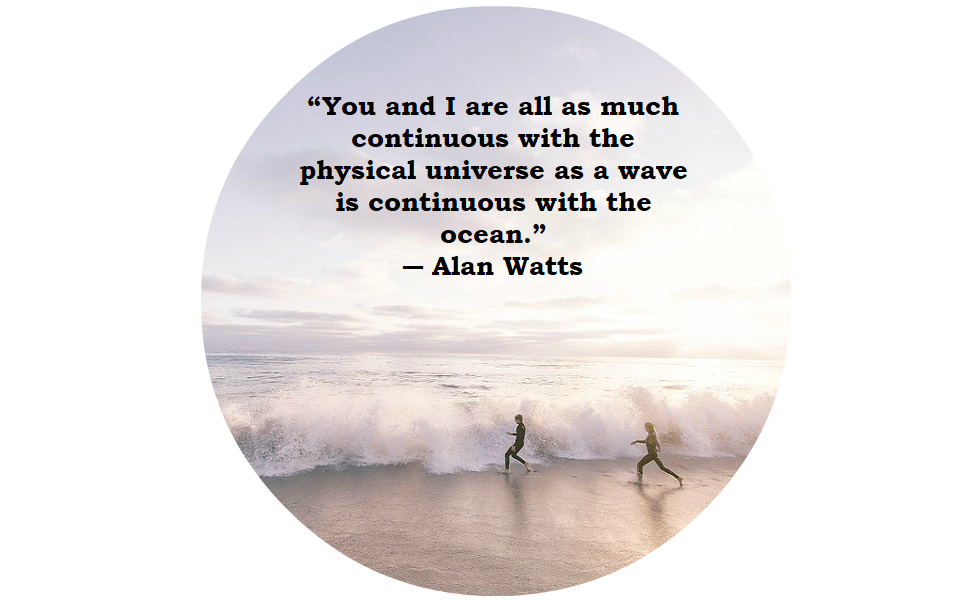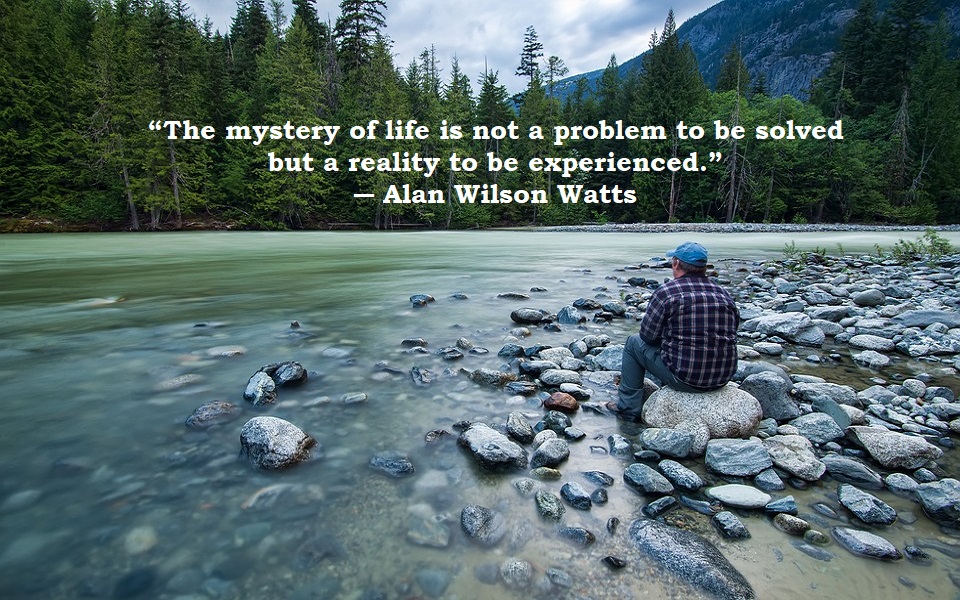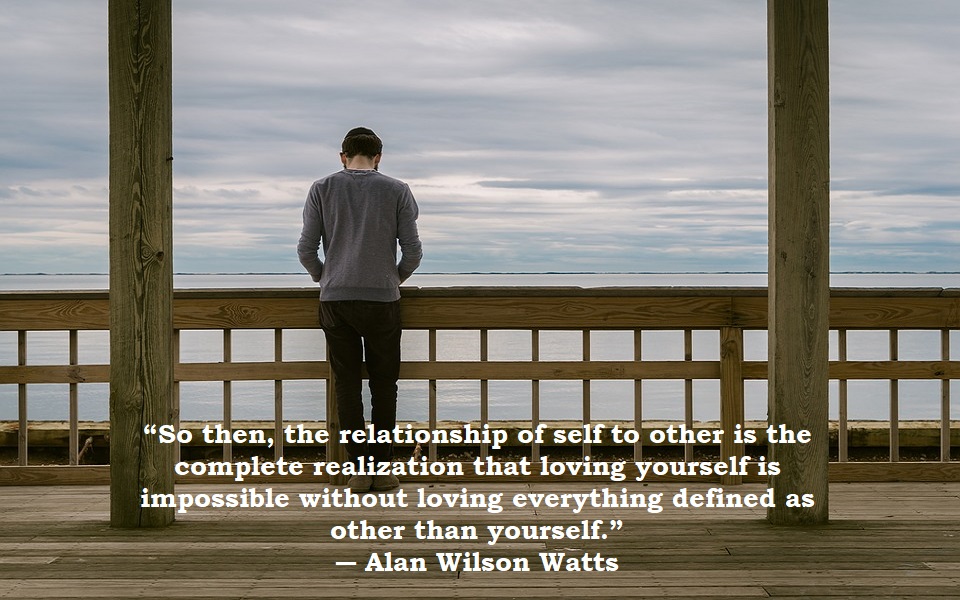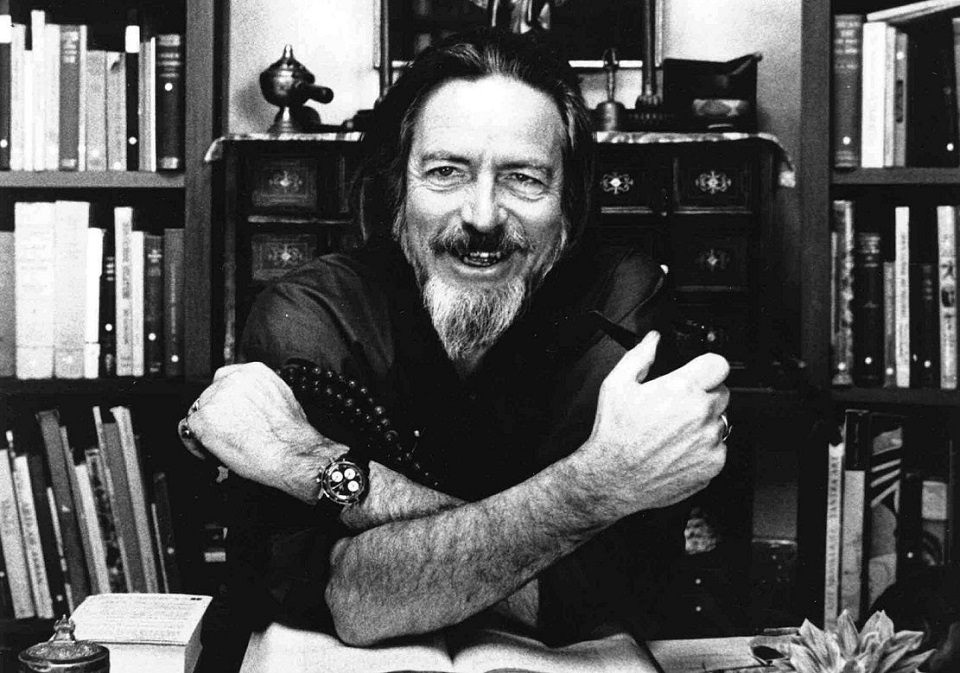Alan Wilson Watts (6 January 1915 – 16 November 1973) was a British-American philosopher who interpreted and popularised Eastern philosophy for a Western audience. Born in Chislehurst, England, he moved to the United States in 1938 and began Zen training in New York. Pursuing a career, he attended Seabury-Western Theological Seminary, where he received a master’s degree in theology. Watts became an Episcopal priest in 1945, then left the ministry in 1950 and moved to California, where he joined the faculty of the American Academy of Asian Studies.
Watts gained a large following in the San Francisco Bay Area while working as a volunteer programmer at KPFA, a Pacifica Radio station in Berkeley. Watts wrote more than 25 books and articles on subjects important to Eastern and Western religion, introducing the then-burgeoning youth culture to The Way of Zen (1957), one of the first bestselling books on Buddhism. In Psychotherapy East and West (1961), Watts proposed that Buddhism could be thought of as a form of psychotherapy and not a religion. He considered Nature, Man and Woman (1958) to be, “from a literary point of view—the best book I have ever written.” He also explored human consciousness in the essay “The New Alchemy” (1958) and in the book The Joyous Cosmology (1962).
Towards the end of his life, he divided his time between a houseboat in Sausalito and a cabin on Mount Tamalpais. According to the critic Erik Davis, his “writings and recorded talks still shimmer with a profound and galvanizing lucidity.”
Information: Wikipedia

- “We do not “come into” this world; we come out of it, as leaves from a tree. As the ocean “waves,” the universe “peoples.” Every individual is an expression of the whole realm of nature, a unique action of the total universe.”
- “If you say that getting the money is the most important thing, you’ll spend your life completely wasting your time. You’ll be doing things you don’t like doing in order to go on living, that is to go on doing thing you don’t like doing, which is stupid.”
- “To remain stable is to refrain from trying to separate yourself from a pain because you know that you cannot. Running away from fear is fear, fighting pain is pain, trying to be brave is being scared. If the mind is in pain, the mind is pain. The thinker has no other form than his thought. There is no escape.”
- “One is a great deal less anxious if one feels perfectly free to be anxious, and the same may be said of guilt.”
- “And people get all fouled up because they want the world to have meaning as if it were words… As if you had a meaning, as if you were a mere word, as if you were something that could be looked up in a dictionary. You are meaning.”
- “How is it possible that a being with such sensitive jewels as the eyes, such enchanted musical instruments as the ears, and such fabulous arabesque of nerves as the brain can experience itself anything less than a god.”
- “A priest once quoted to me the Roman saying that a religion is dead when the priests laugh at each other across the altar. I always laugh at the altar, be it Christian, Hindu, or Buddhist, because real religion is the transformation of anxiety into laughter.”
- “The world is filled with love-play, from animal lust to sublime compassion.”
- “To put is still more plainly: the desire for security and the feeling of insecurity are the same thing. To hold your breath is to lose your breath. A society based on the quest for security is nothing but a breath-retention contest in which everyone is as taut as a drum and as purple as a beet.”
- “What I am really saying is that you don’t need to do anything, because if you see yourself in the correct way, you are all as much extraordinary phenomenon of nature as trees, clouds, the patterns in running water, the flickering of fire, the arrangement of the stars, and the form of a galaxy. You are all just like that, and there is nothing wrong with you at all.”
- “But I’ll tell you what hermits realize. If you go off into a far, far forest and get very quiet, you’ll come to understand that you’re connected with everything.”

- “Other people teach us who we are. Their attitudes to us are the mirror in which we learn to see ourselves, but the mirror is distorted. We are, perhaps, rather dimly aware of the immense power of our social enviornment.”
- “We could say that meditation doesn’t have a reason or doesn’t have a purpose. In this respect it’s unlike almost all other things we do except perhaps making music and dancing. When we make music we don’t do it in order to reach a certain point, such as the end of the composition. If that were the purpose of music then obviously the fastest players would be the best. Also, when we are dancing we are not aiming to arrive at a particular place on the floor as in a journey. When we dance, the journey itself is the point, as when we play music the playing itself is the point. And exactly the same thing is true in meditation. Meditation is the discovery that the point of life is always arrived at in the immediate moment.”
- “We seldom realize, for example, that our most private thoughts and emotions are not actually our own. For we think in terms of languages and images which we did not invent, but which were given to us by our society. We copy emotional reactions from our parents, learning from them that excrement is supposed to have a disgusting smell and that vomiting is supposed to be an unpleasant sensation. The dread of death is also learned from their anxieties about sickness and from their attitudes to funerals and corpses. Our social environment has this power just because we do not exist apart from a society. Society is our extended mind and body. Yet the very society from which the individual is inseparable is using its whole irresistible force to persuade the individual that he is indeed separate! Society as we now know it is therefore playing a game with self-contradictory rules.”
- “There is nothing at all that can be talked about adequately, and the whole art of poetry is to say what can’t be said.”
- “What we have to discover is that there is no safety, that seeking is painful, and that when we imagine that we have found it, we don’t like it.”
- “Really, the fundamental, ultimate mystery — the only thing you need to know to understand the deepest metaphysical secrets — is this: that for every outside there is an inside and for every inside there is an outside, and although they are different, they go together.”
- “If, then, my awareness of the past and future makes me less aware of the present, I must begin to wonder whether I am actually living in the real world.”
- “Paradoxical as it may seem, the purposeful life has no content, no point. It hurries on and on, and misses everything. Not hurrying, the purposeless life misses nothing, for it is only when there is no goal and no rush that the human senses are fully open to receive the world.”
- “If you cannot trust yourself, you cannot even trust your mistrust of yourself – so that without this underlying trust in the whole system of nature you are simply paralyzed”
- “Like too much alcohol,self-consciousness makes us see ourselves double, and we make the double image for two selves – mental and material, controlling and controlled, reflective and spontaneous. Thus instead of suffering we suffer about suffering, and suffer about suffering about suffering.”
- “The clash between science and religion has not shown that religion is false and science is true. It has shown that all systems of definition are relative to various purposes, and that none of them actually “grasp” reality.”
- “Technology is destructive only in the hands of people who do not realize that they are one and the same process as the universe.”
- “Zen is a liberation from time. For if we open our eyes and see clearly, it becomes obvious that there is no other time than this instant, and that the past and the future are abstractions without any concrete reality.”
- “In reality there are no separate events. Life moves along like water, it’s all connected to the source of the river is connected to the mouth and the ocean.”
- “But the transformation of consciousness undertaken in Taoism and Zen is more like the correction of faulty perception or the curing of a disease. It is not an acquisitive process of learning more and more facts or greater and greater skills, but rather an unlearning of wrong habits and opinions. As Lao-tzu said, “The scholar gains every day, but the Taoist loses every day.”
- “In looking out upon the world, we forget that the world is looking at itself.”
- “There are, then, two ways of understanding an experience. The first is to compare it with the memories of other experiences, and so to name and define it. This is to interpret it in accordance with the dead and the past. The second is to be aware of it as it is, as when, in the intensity of joy, we forget past and future, let the present be all, and thus do not even stop to think, “I am happy.”
- “You’re under no obligation to be the same person you were 5 minutes ago.”
- “There is only this now. It does not come from anywhere; it is not going anywhere. It is not permanent, but it is not impermanent. Though moving, it is always still. When we try to catch it, it seems to run away, and yet it is always here and there is no escape from it. And when we turn around to find the self which knows this moment, we find that it has vanished like the past.”
- “Human desire tends to be insatiable.”

